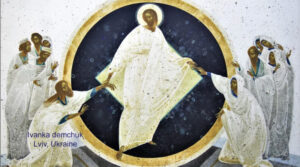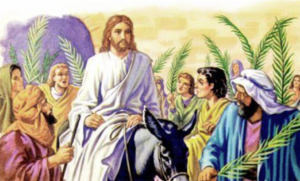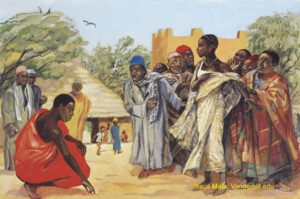“Our paschal lamb, Christ, has been sacrificed.
Therefore, let us celebrate the feast,
not with the old yeast, the yeast of malice and wickedness,
but with the unleavened bread of sincerity and truth.” 1 Corinthians 5: 7-8
In our recent Bible Study we viewed Bishop Robert Barron’s series about David, the second man to be King of Israel. Prior to David, God was Israel’s Ruler and King, but, so much like us today, the stiff-necked Israelites were not satisfied with having God as their king.
David’s story, as related by Bishop Barron using the books 1 and 2 Samuel, is a very human story filled with many moments of triumph and defeat. But Barron notes that “Something else is going on here.” He then asks us to take a deeper dive into David’s reaction on hearing of the death of his son Absalom1 and to relate it to what David could not do but that Jesus did do.
In some ways, David anticipates Christ, and in other ways he is more like the stumbling disciples2 that you and I are.
Both David and Christ were facing the rebellion of their children, their loved ones. David, forced by his son’s agression, leaves Jerusalem, goes down through the Kidron Valley, then up the Mount of Olives. It is a mournful liturgical procession, the same “mournful liturgical procession” walked by Jesus – down the mountain, through the Kidron Valley, up the Mount of Olives, to the Garden of Gethsemane. Jesus recapitulates the liturgical procession of David.
Barron makes this personal to us:
“And then, even as we continue to come at Jesus, nailing him to the cross, hurling all of our invective at him, at the Lamb of God.”
Barron continues, “Now who is covered with the sins of the world? Jesus, the Lamb of God.
“And what does he say? ‘Father, forgive them. They know not what they do,’ which is Jesus own version, it seems to me, of David’s cry upon hearing that his son’s life was lost, ‘Absalom, my son, my son.’
“Even we – who killed him – we who chased him out of Jerusalem, we who went into open rebellion against him – to us, Jesus responds, ‘Absalom, my son, my son.’ Listen again. It is like David’s lament over Absalom, ‘Would that I had died instead of you.’ Ah, now, isn’t that exactly what happened? Jesus on the cross, dying for us, ‘Absalom, my son, my son.’
“Hear in David’s plaintive cry, a foreshadowing of the great forgiving act of Jesus from the cross.”
And will we – you and I – the disciples, the Jesus of today – allow ourselves to be nailed to today’s crosses? Will we allow ourselves to make present the washing away of the sins of all the erring, God-forsaking people of today?
Would that you and I should die instead of those who know not what they do.
May you and your family and friends be blessed with the earth-shaking experience of Easter grace that our ever-with-us God sends our way.
Sister Loretta
- David’s son was killed by David’s soldiers in order to prevent him from killing his father to gain access to the throne.
- The wise Bishop advises us that when we stumble, we should “dig for treasure,” that our stumbles, rather than being moments of embarrassment and shame, are opportunities to deepen our humility, dig to discover the deepest roots of the stumble and, then to acknowledge that the deepest source of our strength is God and not ourselves or anyone else.
 Maybe this Easter
Maybe this Easter
you are finding yourself open
to taking a next step
in your relationship with Jesus.
This could be the moment
you decide to follow Him more closely
and take seriously
all that he has given you.
If so, welcome to the journey,
where there are many other disciples
on that same path
who can help show you the way
and share their stories.
If not, hopefully it doesn’t take a whole year
for this possibility to be considered again.
Jesus is alive
and waiting to get closer to you.
May this Easter season
find you and Our Lord
getting to know one another
in a whole new way.
Happy Easter! —Tracy Earl Welliver, MTS ©LPi




